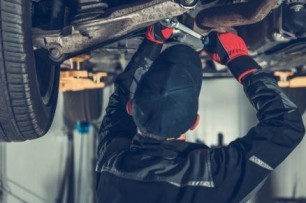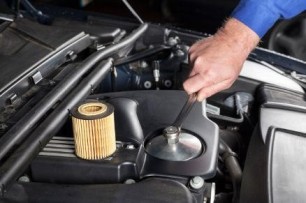General Insurance Blogs, Articles & Updates by - Magma Insurance
Have us call you
- RENEW YOUR POLICY
- BUY NEW POLICY

Best tips to check and maintain your car's suspension
The comfort and the ease of driving your new car are something that you always remember. However, with time, you start noticing small changes and don't feel the same comfort anymore. There could be many reasons for that. Wear and tear in the car seats, engine load, worn-out tyres, etc.
A car’s poor suspension could also be the reason for the growing discomfort. A fully functional suspension system ensures a smooth driving experience and keeps the vehicle under control. Over time the suspension system in the car experiences wear and tear and can take away from you a wholesome driving experience.
A suspension system comprises components such as wheels, tyres, springs, steering, etc. Different driving conditions govern these parts' longevity and wear off over time. To ensure that your car is working in proper condition, it is crucial to recognise any faults in the system and address them immediately to ensure safety while driving.
In this article, we discuss a few ways to check and maintain your car’s suspension.
1. Check air pressure:
Properly inflated tyres ensure that the chassis is protected from any damage. If they are not fully inflated, they can affect the vehicle's handling and performance. This can also be extremely dangerous when driving. To ensure that your tyre pressure is optimum, check it after driving every two thousand kilometres.
2. Wheel alignment:
Wheel alignment is another vital activity that ensures proper and risk-free driving conditions. The more challenging roads you take, the more likely your tyres are misaligned. Wheel alignment should be checked every two years or less, depending upon the kind of tracks you drive on. If you face difficulty while handling the steering or manoeuvring your vehicle, this indicates misaligned wheels.
3. Check power steering fluid:
If you enjoy the comfort of power steering or the hydraulic steering system, then maintaining and changing the fluids is part of your car’s regular maintenance. Check the level at least once a couple of months and replace it every three years. It is best to talk to a mechanic or refer to an owner’s guide to understand your car’s needs better.
4. Inspect shock absorbers:
If your car shudders or bounces abnormally when you drive, then these are indications of flawed shock absorbers. Make a visit to your nearest service centre to have the inspection of the shock absorbers. Ensure to get the shock absorbers checked after the first ten thousand kilometres and then annually. More challenging tracks and changing climates can cause wear and tear faster in the shock absorbers and might need to be changed sooner than mentioned above.
5. Accidents:
Slight irregularities can also affect the working of the chassis. If you have met an accident, hit a huge bump, or ran across a pothole, the chances are that some nuts and bolts could have disoriented from their original position. An inspection by a mechanic will help you rest assured and will not give you any trouble in the middle of the highway.
These are some ways to ensure that your car’s suspension works correctly. To avoid extra expenses or a complete breakdown, it is best to undergo regular servicing and check-ups for your vehicle. These services are a way of ensuring that every part of your vehicle is functioning effortlessly and efficiently.
Ignoring problems can lead to several damaged parts, which can be extremely dangerous when driving. Buy private car insurance India to ensure maximum safety and an amazing driving experience for your car. The right insurance boosts the longevity of your vehicle and undertakes expenses that might cost you a huge amount.
Click HERE to know more about private car insurance India.
Disclaimer: The information provided above is for illustrative purposes only. To get more details, please refer to policy wordings and prospectus before purchasing a policy.

Five reasons your car undergoes acceleration problem
Car acceleration issues, apart from being bothersome, can also be dangerous. There are several reasons why your car might have a problem while accelerating. Technically, when you push the gas pedal, several components and sensors work seamlessly to move the vehicle forward and achieve that speed. Even a minor failure in this whole system can hamper your car's acceleration.
The car's internal combustion engine needs to breathe to accelerate quickly and develop the desired thrust and power. It compresses a specific amount of air and fuel ignited in the combustion chamber. The exhaust gases from the process are released through the tailpipe. If there is any disruption in the process, a loss in power will occur.
Engine performance has been controlled by the Engine Control Module (ECM) since the 1980s. The ECM uses the data from several different sensors to administer the combustion process. Issues in air and fuel delivery sensory problems are the leading cause of acceleration malfunctions.
Let's discuss the reasons your car may undergo acceleration issues in detail.
1. Check the air filter:
If you're facing trouble accelerating your car, you might need to check the air filter. The function of the air filter is to trap dirt and other impurities and prevent them from entering the combustion chamber. A clogged air filter prohibits the air from entering the combustion chamber, further affecting the process.
2. Keep the fuel system clean:
A clogged or dirty fuel system also disrupts power generation, thus affecting the vehicle's acceleration. The fuel does not reach the combustion chamber and therefore starves the engine and causes low power.
3. Fix the ignition:
Ignition issues can be one of the leading causes of acceleration problems. These systems are designed to ignite the air/fuel mixture by creating a powerful spark. However, poor-quality ignition wires or dirty power plugs can cause trouble in the complete burning of fuel in the combustion chamber. This results in the loss of power necessary for achieving quick acceleration.
4. No way out for the exhaust gases:
Exhaust gases from the collapsed catalytic converter get trapped at times which hinders the breathing capability of your engine. This inhibition builds up excessive back pressure and causes a significant loss of engine power.
5. Have a functional O2 sensor:
The oxygen (O2) sensor measures post-combustion oxygen levels in the exhaust chamber. A slow-reacting, damaged, or dirty O2 sensor is responsible for the quality of the air/fuel mixture, which impacts the engine, thus affecting the acceleration.
Some other reasons due to which your car undergoes acceleration problems are:
• A slipping clutch disk that doesn't wholly engage with the transmission to the engine.
• A dirty or defective mass airflow sensor (MAF) affects the engine's airflow, causing a strain in acceleration.
• The throttle plate position and movement are measured by the Throttle Position Switch (TPS). A problematic TPS data affects the air/fuel mixture engine speed and ultimately strains the acceleration process.
Now that we have discussed several reasons for an acceleration problem, it would be a wise choice to purchase car insurance to protect your vehicle and you against unanticipated troubles. Mishaps come uninvited, so you need to be prepared during the good to be safe during the worst.
Address the above problems related to acceleration and fix them at the earliest to ensure safe travel. If your car demands extensive repairing, don't refrain from visiting a mechanic. Instead, guarantee your repairing expenses with car insurance benefits and make your vehicle functional again.
Click HERE to know more about car insurance.
Disclaimer: The information provided above is for illustrative purposes only. To get more details, please refer to policy wordings and prospectus before purchasing a policy.

Five reasons why eating in your car is a bad idea
Distracted driving is one of the most common reasons for fatal car accidents. However, calling and texting are not the only forms of distractions for driving. When it comes to the most distracting factors while driving, many individuals overlook eating. If there's one thing we can all agree on, it's that we've all had to eat our meals on the go, or at least the majority of us have.
When behind the wheel, drivers must keep their attention on the road and adhere to all safety rules to be safe. People who eat while driving are multitasking and diverting their focus away from the road, putting multiple lives at risk.
Learn more about the unpleasant reality of eating in your car.
1. Reaction set back:
Your response time will be slower and delayed if your eyes and focus aren't on the road. Accidents might occur as a result of delayed reactions. Your brain and senses need to respond swiftly to sudden changes on the road. Therefore, you cannot afford to preoccupy your attention with other activities like sipping coffee or having a burger while driving.
2. Bug alert:
You're creating a biohazard food trap by treating your car as a makeshift dining room. Engineers compress a lot of components into a tight area, a plethora of even narrower spaces that only French fries and breadcrumbs seem to fit. It has the potential to become a gold mine for insects and other small creatures.
3. Health faux pas:
While eating in the car can be handy, it rarely equates to healthy eating. The common fast-food alternatives at drive-through restaurants are easy to devour mindlessly. However, mindless eating is incompatible with regular, more natural eating habits, so you're more likely to ignore your health and instead grab something else at your next stop.
4. Creates distraction:
When you eat while driving, you aren't paying attention to what's happening around you. You might be concerned about staining your clothes or spilling your drink. If your eyes are off the road, you may miss changes in traffic patterns or fail to see a car in your blind zone.
5. Hands off the wheel:
You'll have to take your hands off the wheel at some point if you're eating while driving. Whether opening a packaged sandwich or a lunch box, people who eat while driving will let go of the wheel, generating a disturbance.
Being the person behind the wheel, you cannot take even a slight risk of taking your hands off the wheel. You don't just steer the vehicle, but even the safety of you and your co-passengers.
Negligent driving is a rising issue nationwide, and it needs to be addressed with immediate actions by spreading awareness and implementing the rules strictly. It will also be challenging to claim unintentional damage if proven at fault while driving.
So, say no to eating in the car and maintain good car hygiene. Good upkeeping of the car interiors, regular dry cleaning, and car insurance are considered healthy car habits. So, follow the above tips and check for the best car insurance in India to be financially safe and secure your possession. If you want to live a better lifestyle, it's time to give up eating in your car.
To look for the best car insurance in India, click HERE!
Disclaimer: The information provided above is for illustrative purposes only. To get more details, please refer to policy wordings and prospectus before purchasing a policy.

Complete guide on when to change car filters
The most commonly overlooked part of car servicing is changing the filters regularly. This task is a big mystery for many as to when is the right time to change a car filter and how to do it.
Timely change and maintenance of your car filters help optimise the motor parts' functionality and allow them to function efficiently. However, you need not be a mechanical whiz to notice the signs of when to change your car filters. This blog aims to help you understand the signs or hints your car gives indicating an immediate filter change.
1. Cabin filter:
A cabin filter is used to clean the inside of your car. This is done using air conditioning or heating vents. Clean air inside the vehicle is imperative for personal health and for preventing allergies and other respiratory problems. Unclean or damaged filters can block the airflow and cause visibility issues when defogging the windows.
Cabin filters must be changed every fifty thousand kilometres. Still, it is best to talk to an expert mechanic or consult the manual for recommended vehicle maintenance. If the air from the vents blows with less force or contains an unpleasant odour, your filters likely need to be changed.
2. Fuel filter:
The fuel filter helps keep dust, rust, and other impurities at bay. By removing the contaminants, this filter ensures the efficiency and performance of the engine. A clogged fuel filter can experience difficulty in the free flow of fuel, so the engine pumps harder than it needs to. It can lead to poor acceleration or a troubled start every time.
It is suggested that the fuel filters must be changed after fifty thousand kilometres. But these criteria often keep changing according to your vehicle's build and brand. If you start noticing decreased power, stalling, difficulty accelerating while going uphill, shuddering movements, and difficulty starting the engine, these are signs of a clogged fuel filter.
3. Air filter:
An air filter in the car is used to prevent insects, sand, debris, and other minute particles from entering the engine. Air filters ensure a good mixture of air and fuel to enhance the engine's performance. The cleaner the air in the engine, the more power the engine has. Good air filters also ensure better combustion, thus reducing fuel consumption. A clogged air filter leads to incomplete combustion and releases impure black smoke from the exhaust.
Air filters can be changed every twenty thousand kilometres. The interval can vary depending on the tracks you choose daily. You should reduce this interval if you drive on dirty or dusty tracks. Decreased mileage, strange noises, less power, black smoke, or strong fuel smell are symptoms of clogged air filters. You should rectify these issues immediately upon notice.
4. Oil filter:
The oil filter ensures continuous oil flow and removes dirt, impure oils, and metal particles in motor oil without hindering lubrication. All moving parts, such as the rods, shaft, etc., are protected from damage if the oil filter functions well. Change the oil filters between ten thousand kilometres to fifteen thousand kilometres.
Poor performance, metallic noises, and low oil pressure are some signs indicating a damaged oil filter.
We have discussed everything you need to know about the various car filters and their purpose. Proper maintenance and servicing are essential to keep your car in good condition. To ensure the financial coverage for your vehicle's care, always look for insurance options provided by the best car insurance company in India.
Click HERE to know more about the best car insurance company in India.
Disclaimer: The information provided above is for illustrative purposes only. To get more details, please refer to policy wordings and prospectus before purchasing a policy.

